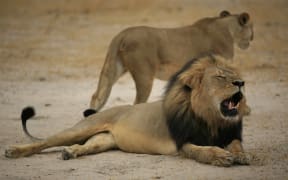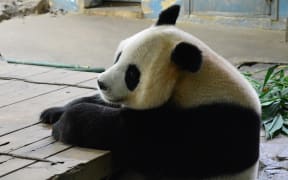The killing of a well-known, much-photographed lion by an American dentist has caused a storm on the internet, both here in New Zealand and overseas.
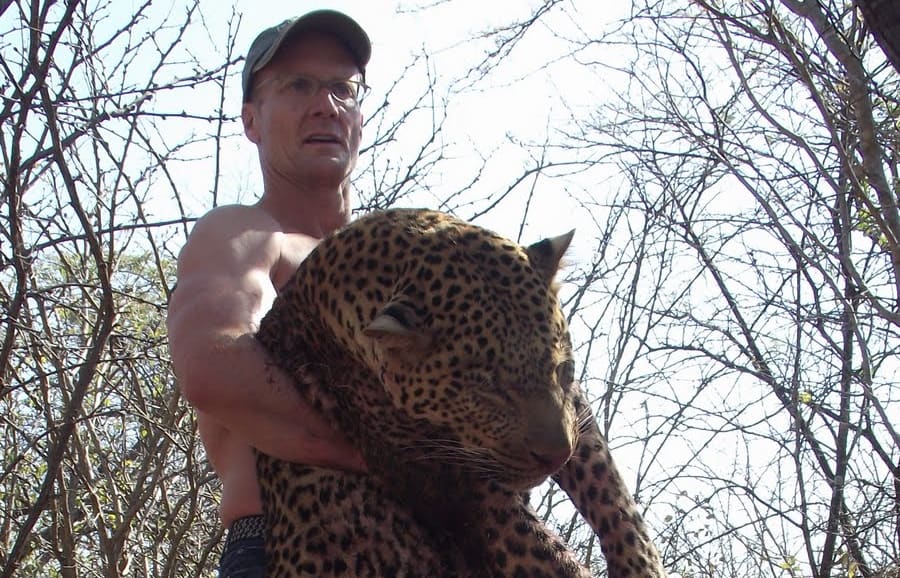
Walter Palmer poses with a leopard he had shot for a hunting blog. Photo: Supplied
Walter Palmer, an enthusiastic 'big game' hunter from Minnesota, first landed himself in legal hot water in 2006 over the hunting of a black bear in Wisconsin.
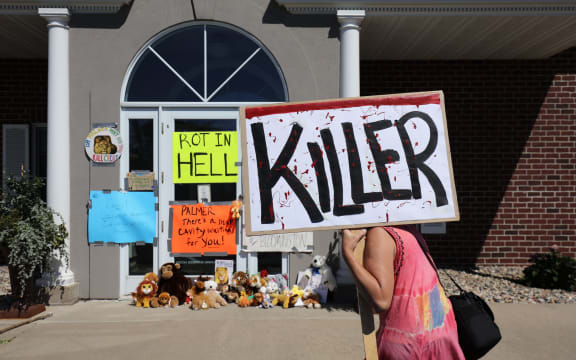
Protesters gathered outside Dr Walter Palmer's clinic in Bloomington, Minnesota. Photo: AFP
Since being connected with Cecil's death, he has received hundreds of vitriolic messages, including death threats, and has had to close his physical clinic and take down the practice's site.
Earlier this year, he paid $US50,000 to professional guides to go on what he said he believed was a legal hunt, where he is said to have shot Cecil the lion with a crossbow and rifle.
The two Zimbabwean men - a professional hunter and the farm owner - have been charged with poaching offences, as they did not have a hunting permit, and face up to 15 years in prison.
#CecilTheLion outrage online
Social media has erupted in anger over the reports, with high profile figures including comedian Ricky Gervais taking to Twitter, brandishing the hashtag #CecilTheLion.
RIP #CecilTheLion I'm struggling to imagine anything more beautiful than this pic.twitter.com/lile3Kb2dk
— Ricky Gervais (@rickygervais) July 28, 2015
#WalterPalmer is Satan. I don't know how anyone could go to this man for dental services after this. He is a killer. Beware!
— Sharon Osbourne (@MrsSOsbourne) July 28, 2015
— Ricky Martin (@ricky_martin) July 28, 2015
British journalist and television personality Piers Morgan wrote in his Daily Mail column that he would "sell tickets for $50,000 to anyone who wants to come with me and track down fat, greedy, selfish, murderous businessmen like Dr Palmer in their natural habit.
"Like Cecil, he's an ageing, greying creature seeking out the last quarter of his life. He's going to die soon enough anyway, right?"
New Zealanders were also quick to respond to the event, both on the ground and via social media.
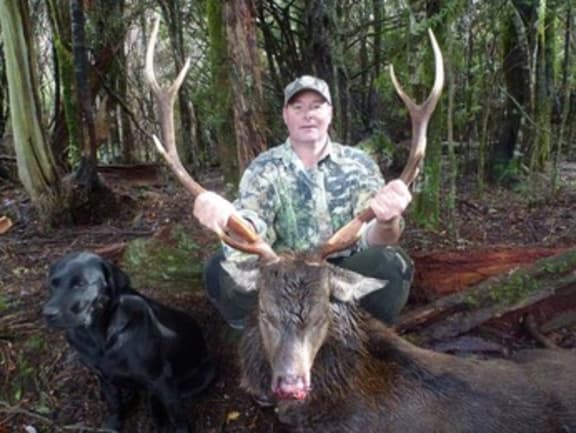
Brian Elwarth with a sika deer. Photo: Supplied
Kiwi hunter Brian Elwarth has been hunting since he was 15, and spends up to 10 months a year travelling round the world as a professional hunting guide.
In an interview with The Wireless, he said that killing a giraffe, for instance, helped provide two tonnes of meat for the local village.
"We actually felt really good because we knew how many people were going to benefit from that protein."
He told Radio New Zealand this morning that he saw the appeal in hunting, but said there was no justification for killing an endangered animal like Cecil.
"It's simply a deep-rooted instinct that some people have. If you eat meat, you pay someone to kill it for you - I just choose to kill it myself."
New Zealanders on Twitter also spoke out about the incident, taking the opportunity to voice their opinions both on hunting and on specialist hunting holidays.
#CecilTheLion - what a horrible thing to happen. Change is needed. And.... Why as a human would you want to kill such a beautiful animal?
— Rachel Kemp (@RachieMouse) July 28, 2015
Really hope one of the outcomes of the outcry for the killing of #CecilTheLion will be a long hard look at the practice of hunting holidays
— Neville (@1FightingIrish) July 29, 2015
Rationally, I want to say the lion killer thing needs to be kept in perspective. Viscerally, I hope he suffers greatly for his actions.
— Luke Goode (@LukeGoode) July 29, 2015
Hunting is not a sport, period. In any other sport, all participants are choosing to take part. Rest in peace #CecilTheLion. My heart hurts.
— Amanda Ellen Thomas (@hrcomesthesun_) July 29, 2015
Hayley Hoppe, originally from Auckland, lives in the US with her two children. She took part in the peaceful protest outside Palmer's office in Bloomington.
In an interview with NZME, she said she had always been an 'advocate' and wanted her daughters to stand up for what was right.
"We get the girls involved in current affairs and when I told them about Cecil being killed, they weren't happy," Mrs Hoppe said.
"We weren't doing it about Palmer, we were doing it for Cecil.
"As Kiwis, we are scrappers."'
Hunting as conservation?
But is there ever an argument for shooting threatened or endangered animals?
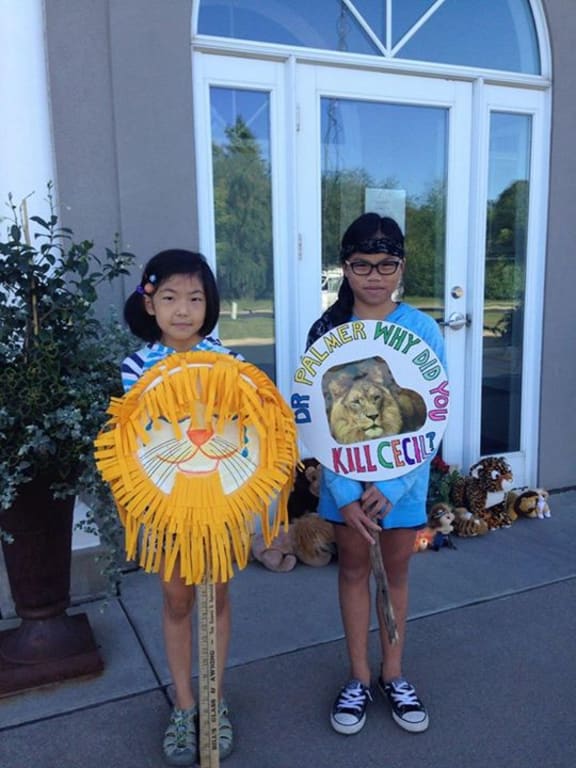
Hayley Hoppe's two daughters protesting outside Walter Palmer's office. Photo: Supplied
In the last 30 years, the population of lions in Africa has halved to 32,000, while some estimates put the number in Zimbabwe at just 500.
Cecil's distinctive black-fringed mane made him a well-known animal around the park. He was relaxed around safari vehicles and, so, made easy photographic fodder.
Hunting lions is legal in Zimbabwe and South Africa, though foreigners must be accompanied by a licensed professional, but illegal in Kenya and Botswana, which make a lot of money from wildlife safari tours.
Advocates for trophy hunting cite the contribution it makes to the GDP of countries like Zimbabwe, though despite 17 percent of its land being given up to trophy hunting, it only contributes a total of 0.29 percent to GDP and about 3.2 percent of its tourism revenue.
The International Union for Conservation of Nature said that trophy hunting could help to create financial incentives to conserve species and their habitats, and observed that individuals paying large amounts to kill a single animal were "high in value but low in impact".
Dr Bruce Robertson, who teaches Conservation Biology at the University of Otago, said hunting was not a sensible approach for supporting endangered species.
"I don't think hunting is the right way to go to justify retaining species: you stimulate an economy in that endangered species, and then if you can't control it, you run into problems," he said.
"It's better to make species worth more alive than they are dead, so people take cameras rather than guns when they're getting that wildlife experience.
"The key is to make sure that it trickles down to the local community, so you don't want to kill the animal, because you'll get more money out of it alive than dead, which helps to limit the attractiveness of poaching."

